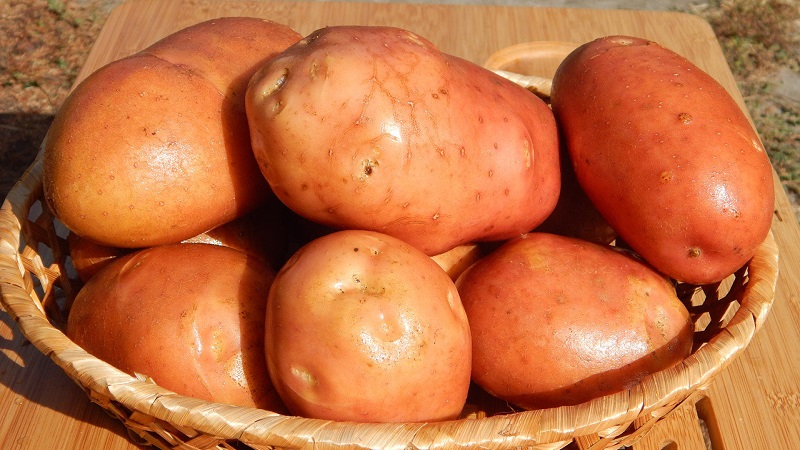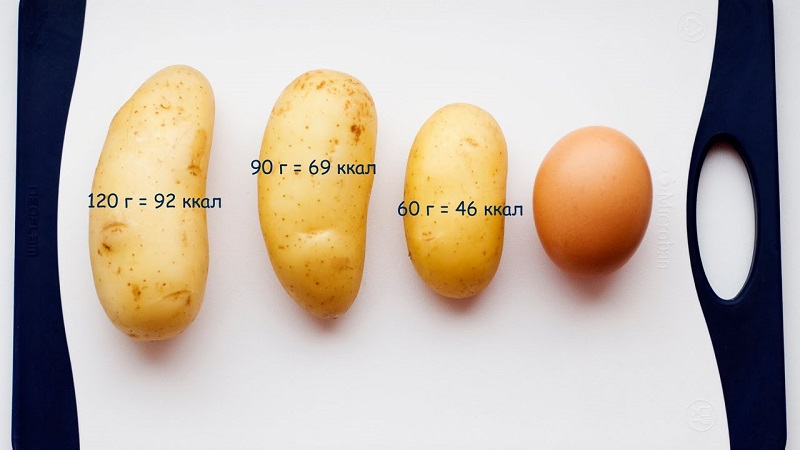We determine the weight of the crop by eye: how many potatoes are in 1 kg and how to roughly estimate the weight
By the most conservative estimates, potatoes are used in more than 3,000 recipes. And often the amount of ingredients is indicated by weight: either in grams or in kilograms. And very rarely - in pieces. But what if you don't have a kitchen scale at hand, and you need to measure the amount at least approximately? In this case, the best way out is to measure the potatoes in pieces and just remember these values.
The content of the article
1 kg of potatoes - how much is it?
Measuring a kilogram of potatoes in pieces is not the most accurate way to measure, but the result is close to the truth. Agree, it is better to count this ingredient in pieces and understand that this is close to the recipe than to cook completely blindly.

A small error of such a measurement is not terrible for cooking.... But there is an obvious plus - the hostess, going to the market or to the grocery store, will be able to determine by eye how much to buy and whether she will bring that much home with all the other products.
Since it is difficult to find potatoes of equal size, the total number of them in one kilogram may be different. But medium tubers will be about 7-8.
Important! Potatoes of the same size, but not of the same variety, differ in weight - due to different density, water content and starch.
The number of potatoes in 1 kg
So how many potatoes are there in a kilogram? It depends on their size:
- There is a frank little thing - potatoes, which are called "like peas." The weight of one piece is about 20 g. This "pea" is usually used as feed for livestock and planting, you will not find this in stores. Since the size of the potatoes is smaller, the gaps between them in the bag will be smaller, which means that the bag will fit more by weight than large vegetables - about 50-60.
- In shops and markets, small potatoes are considered to be the size of a chicken egg or slightly less. Average weight - about 80 g. There are 15 pieces of such nodules per kilogram.
- Smooth, clean potatoes the size of a child's fist in one kilogram will fit 10-12 pieces. The weight of each such tuber will be about 100 g - you can measure it for yourself once in order to clearly remember. In a store packing bag, about 2 kg of small tubers are placed - respectively, 20-24 pieces.
- There will be 13-15 tubers of medium size in the same plastic bag. Therefore, in one kilogram - 6-8.
- There are at least 5 large potatoes in one kilogram. But there are times when four especially large tubers are enough. The average weight of a large specimen is 230-250 g.
Important! For convenience, it is better to take potatoes slightly smaller than the average size. They fit comfortably in the palm of your hand, they are easier to clean and cut, which means that the cooking process will be faster, easier and more pleasant.

How to determine the approximate weight
There is an interesting scheme for calculating the approximate weight of one tuber... For these purposes, choose potatoes without growths, even and clean.
Interesting on the site:
The benefits and harms of potato broth
For clarity, let's take an oval tuber 12 cm long (as from the beginning of the palm to the middle of the index finger) and a width of about 7.2 cm.With such parameters, its weight will be 192 g.
Further, as in a math lesson, we take the figure of the required weight "x" in grams and divide it by 192 g, getting the quantity in pieces - "y":
x: 192 = y
for example: 500: 192 = 2.6. That is, 500 g of potatoes is 2.6 tubers.
On a note! If the number of potatoes is not whole, for example 8.2, take 9 pieces. Don't forget: when cleaning, you will cut off the excess and the grams will go away.
Total:
- 0.5 kg (500 g) potatoes - 2.6 pieces, round up to 3;
- 1 kg (1000 g) - 5.2 such potatoes, round up to 6;
- 1.5 kg (1500 g) - rounded 8 potatoes;
- 2 kg (2000 g) - 11 pieces rounded.
Very similar to the problem from the school math lesson, but such calculations are really correct... It remains only to count the correct amount of potatoes for your dish - now you can do it without scales!
Read also:
Conclusion
Choose medium potatoes, because they are easier to count for cooking and fit more compactly in a bag. Also, medium tubers are easier to peel and cut.